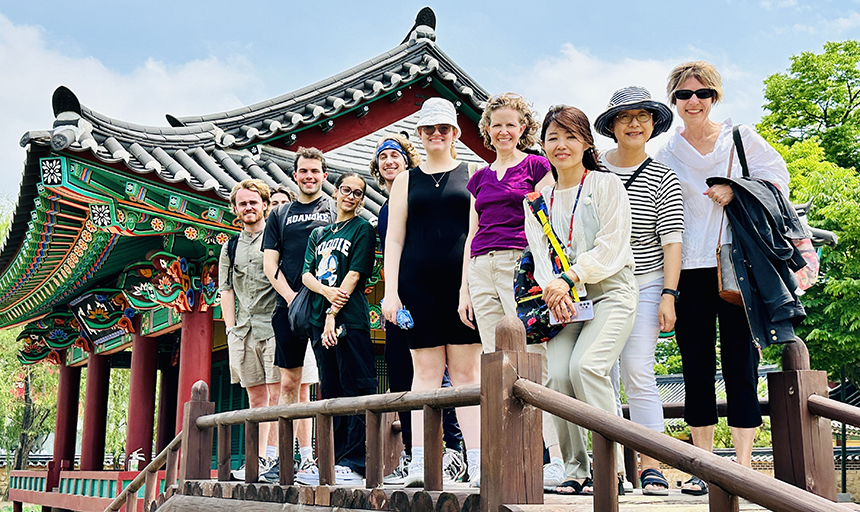
Stella Xu knew the research trip to Korea would be “the trip of a lifetime” for her students, some of whom had never even traveled on an airplane, but she had no idea they would be featured on the front page of a major Korean newspaper – and score a private tour of Deoksugung Palace from Prince Yi Jun himself.
The trip, which took place in June, focused on researching the legacy of American protestant missionaries in contemporary Korea and further exploring the history and connections of two historic Korean figures who attended Roanoke College: Kim Kyusik, vice president of Korean Provisional Government and leader of the Korean Independence Movement; and Prince Eui-hwa, the second son of Korean Emperor Kojong and one of the first from his country to study abroad.
The research team of six students was led by Stella Xu, John Turbyfill Professor of History, and Whitney Leeson, professor of history and anthropology. The project is one of five that was funded by the ASIANetwork’s Student-Faculty Fellows program in 2023. The students were: Owen Collander '23, Lewis Edwards '24, Ashton Howard '24, Cameron McDonald '24, Jake Strohl '25 and Elizabeth Walton '24. This is the third ASIANetwork grant Xu has received to conduct student research trips. The first was to China and the others were to Korea.
The group visited and met dignitaries from several churches and seven schools and universities as part of their exploration of the legacy and role of missionaries in the founding of the Korean Republic. Saemun’am Church was founded by Horace Underwood and was the home church of Kim Kyusik. The group met Dr. Kim Soo-oak, granddaughter of Kim Kyusik, who is the president of the the Korean Provisional Government Memorial Foundation. She and the students attended services together and shared dinner and conversation about Kim’s life and the legacy of 19th century missionaries in contemporary Korea.
The team’s church research and a visit to Kyungsin High School caught the attention of Deputy News Editor Jung Ji-seop at the Chosun Daily newspaper. His article showed pictures of the Roanoke team with a statue of missionary Horace Underwood holding the hand of a young boy, Kim Kyusik. Underwood brought western-style education to many children, including Kim, who went on to graduate from Roanoke College, earn a master’s degree from Princeton and return to Korea to train students. Kim was dispatched to the Paris Peace Conference in 1919 as foreign minister of the Provisional Government of the Republic of Korea. The multilingual skills he acquired at Roanoke College made him a perfect fit for the job. He worked to keep the two Koreas together but was tragically kidnapped by North Korea and died in captivity.
The newspaper article and much of the trip emphasized the Korean tradition of juniors and seniors. Kim Kyusik was a “great senior” to the modern day “juniors” from Roanoke College, who traveled across the world to learn more about his life in Korea.
“Seniors must always help and support their juniors, and juniors are always looking up to their seniors and learning from their history,” Xu said. “It’s a mutually bonded relationship, and we could see this relationship transcending all boundaries of time, race, gender, class and more.”
Collander provided a quote for the Chosun Daily article: “I studied the life of Kim Kyusik in earnest before coming to Korea, and I feel great that the person who lived through the turbulent times is my college senior.”
A surprise opportunity arose when Xu received an invitation from Prince Yi Jun, who wanted to meet the Roanoke College group. Yi Jun is the direct descendant of Prince Eui-hwa, the Korean prince who attended Roanoke College among the first group of Koreans to study outside their country in the early 1900s.
As chairman of the Prince Imperial Ui Memorial Foundation, Yi Jun knew of the Roanoke College research project and said he would be honored to offer hospitality to the juniors of his great grandfather, Prince Eui-hwa. He treated the group to coffee, smoothies and treats at the Choson Westin Hotel, where students could see the Heavenly Altar of Choson Dynasty right outside the windows, and gave them a tour of the palace where he was born.
“The prince and other relatives are very proud that Prince Eui-hwa was a progressive figure,” Leeson said. Korea Times referred to Prince Eui-wha as “the most progressive, anti-Japanese prince.” His education at Roanoke College clearly had an impact on his approach to the Korean Independence Movement against the colonial occupation of Japan.
Roanoke has provided me with several hands-on experiences, but none more impactful than this.
~ Lewis Edwards '24
“Cementing those ties is critical,” Leeson said. “The project went a long way toward making lots of people aware of Roanoke College and our historic connections to Korea but, equally important, our ongoing interest in contemporary Korea. Dr. Xu did an amazing job of representing Roanoke College abroad.”
The group also toured Seoul Line, a global shipping company. D.K. Lee, the founder and CEO, is a strong community advocate who does much in his own community and has established the Kim Kyusik Endowment for East Asian Studies at Roanoke College. He helped coordinate some logistics of the group’s trip.
Xu said the chance to conduct fully funded field research abroad was a precious opportunity for the students. “It is rare not only on the Roanoke College campus, but for any college student in the U.S. This fits and attests to the unique and high-quality education Roanoke is providing.”
Xu went on to say that the team made two important connections during their trip. “We got to reconnect with the Prince Euihwa Memorial Foundation and Kim Kyusik’s granddaughter, and we visited Kyongsin School, where Kim Kyusik was a teacher and board member. By talking to people related to our two Roanoke College alumni, we really can feel the impact of Roanoke history as far away as Korea.”
Although the trip involved a lot of interviewing and work, the group also found time to explore. They visited Seoul’s celebrated Kyongbokgung Palace, a beautiful historic site where visitors are encouraged to wear hanbok attire while touring the grounds.
In addition, the group visited Wonju, the sister city of Roanoke, Virginia, and met with Won Gangsoo, the mayor of Wonju. They visited several important missionary sites associated with Wonju Christian Hospital. They saw the medical bag from Dr. Bob Roth, a Roanoke area plastic surgeon and medical missionary who started the Roanoke-Wonju sister city program in 1964. They also toured the Korean Paper Museum and made Hanji, traditional Korean paper made from mulberry bark. The Wonju visit wrapped up with a hike to Wonju’s famous suspension bridge at Ganhyeon.
The trip also included a stop at the DMZ (Demilitarized Zone) where students rode across the river on the Imjingak Peace Gondola to visit a new Korean War museum. The museum is housed in an old bowling alley for American soldiers who were based at Camp Greaves with the U.S. Second Infantry Division.
Finally, the team visited the campus of Pukyong National University in Busan, where Roanoke College just established a direct exchange program. With unprecedented rising interest in Korea among college students, this new exchange program will serve more diverse interests of students who want to study in Korea.
Now that the group is home, they will follow up with their field research by making podcasts and sharing their research and experience with local communities and at national conferences.
“They are eager to be goodwill ambassadors to strengthen ties of Roanoke College, the U.S. and Korea,” Xu said.
Edwards said he will be forever grateful to Roanoke College and professors Xu and Leeson for the experience.
“To study a topic outside of my regular studies on campus, in a country where I am outside of my comfort zone, is an experience that I will carry forward with me forever in both my personal and professional life,” he said. “Roanoke has provided me with several hands-on experiences, but none more impactful than this.”
ASIANetwork research trip to Korea
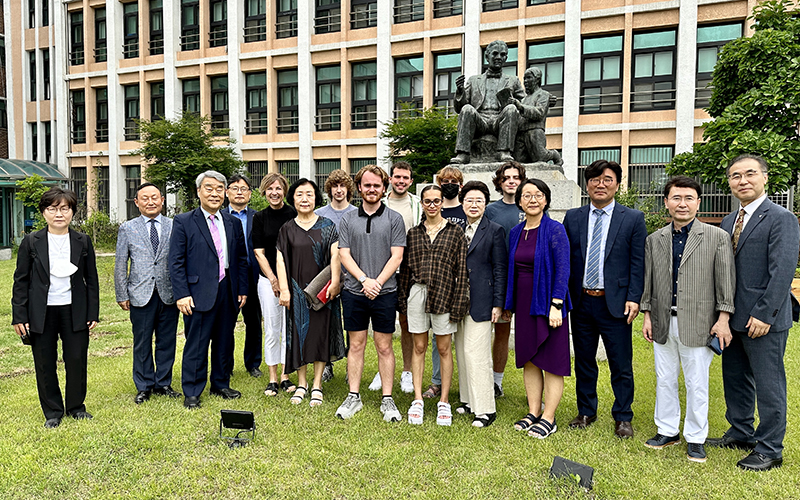
Roanoke students and professors stand in front of the Horace Underwood and Kim Kyusik statue outside the Underwood School.
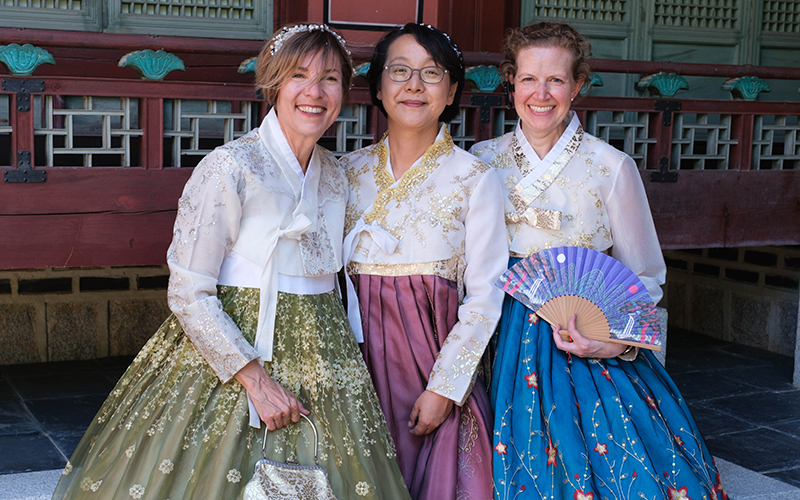
Whitney Leeson, Stella Xu and Mary Henold wearing Korean hanboks.
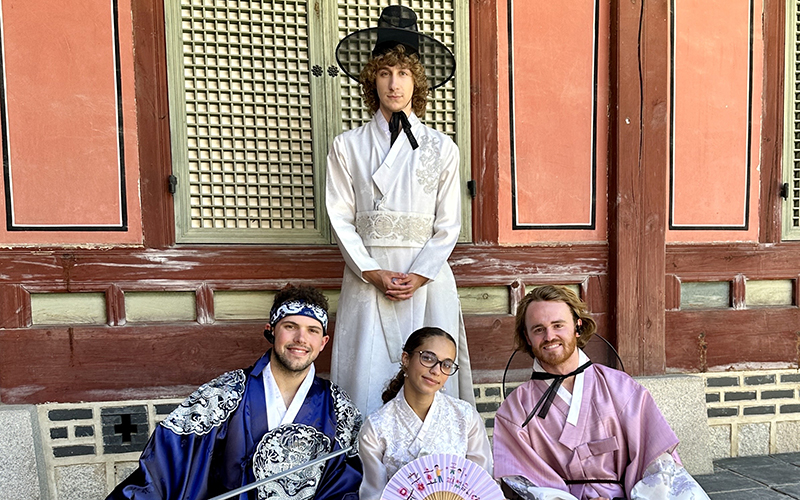
Roanoke students wearing Korean hanboks.
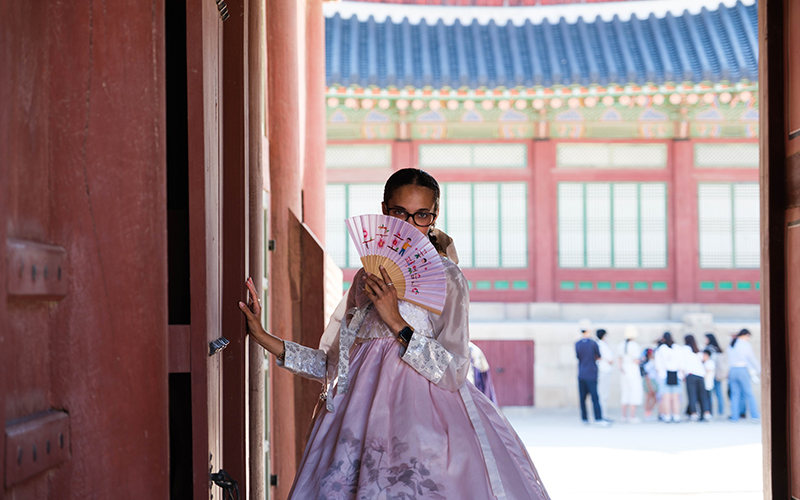
Ashton Howard '24 poses in a Korean hanbok.
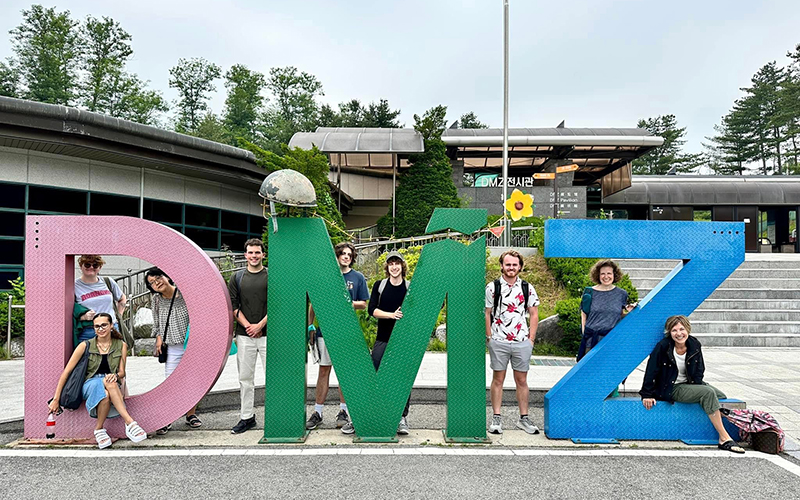
Roanoke professors and students at the DMZ (DeMilitarized Zone from the Korean War.)
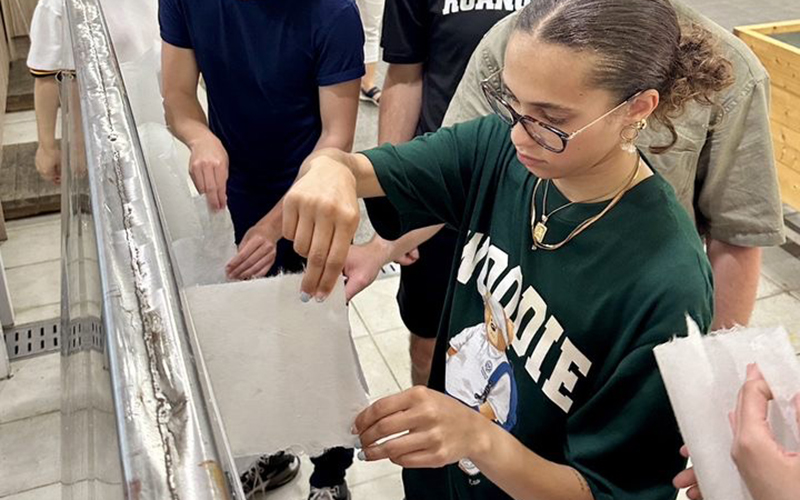
Ashton Howard '24 making Hanji, traditional Korean paper.
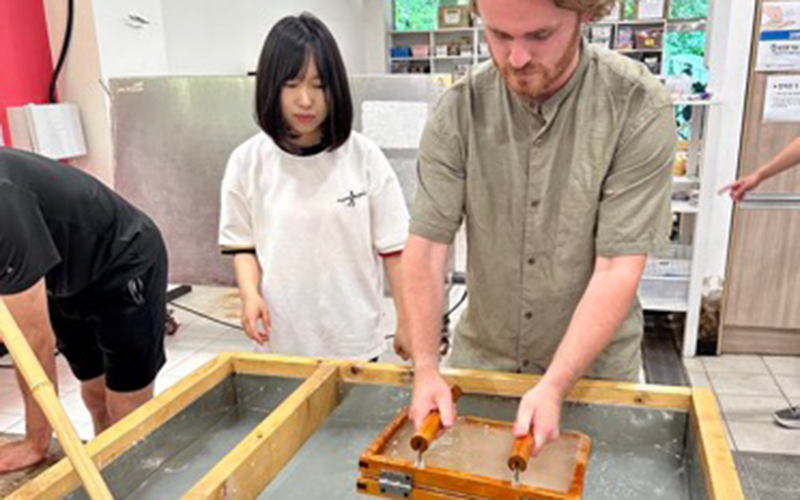
Lewis Edwards '24 makes Hanji, traditional Korean paper.
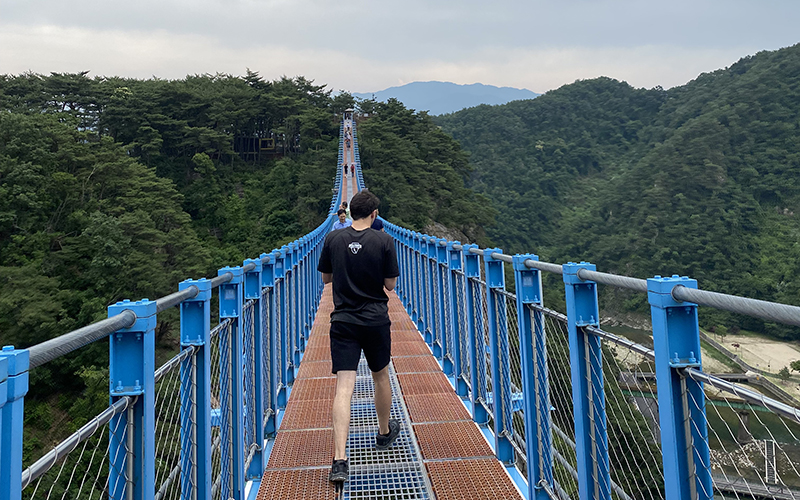
Student walks on a suspension bridge in Wonju.
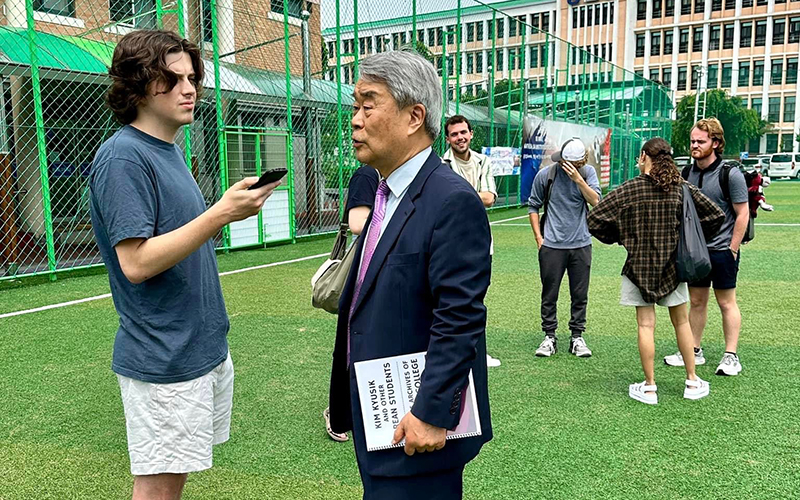
Owen Collander '23 interviews a dignitary at the Underwood School.

Stella Xu points to a sign with her name and title in both English and Korean.
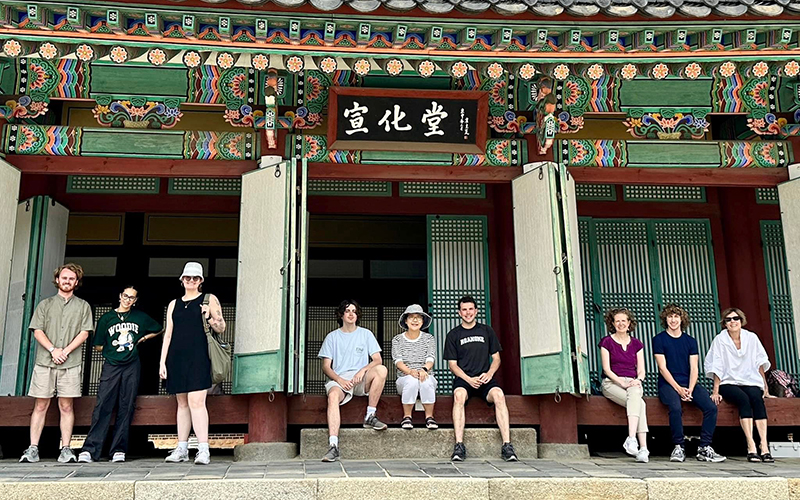
Roanoke students and professors at a historic Korean site.